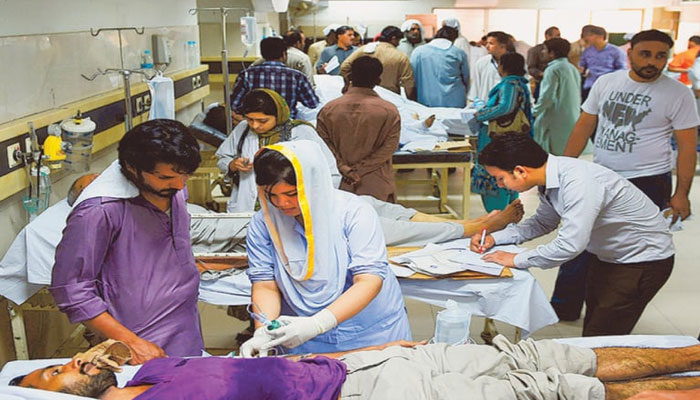Unnecessary suffering
For most Pakistanis, experiencing a serious medical ailment or emergency is akin to a death sentence. This is both due to a lack of access to quality care in many parts of the country, particularly in rural areas, and inability to afford quality care where and when it is available. As a result, many of our people continue to die unnecessary deaths from curable conditions. As the world marks International Universal Health Coverage (UHC) today (December 12), the day on which in 2012 the UN General Assembly endorsed a resolution urging countries to accelerate progress towards universal health coverage, Pakistan seems as far from giving all of its people access to quality, affordable health care as it was 11 years ago.
The WHO’s UHC service coverage index assigns Pakistan a value of 45, as of 2021, which is lower than India, Bangladesh and Sri Lanka. A big part of the problem is our high out-of-pocket spending on healthcare, accounting for around 55 per cent of our total current health expenditure as of 2020. This leaves the poor acutely vulnerable to sudden medical emergencies and this vulnerability has only been exacerbated by our ongoing economic crisis and the ensuing rise in the price of medicines.
Sadly, those in charge do not appear to be in any hurry when it comes to attaining the goal of universal health coverage. Our federal healthcare budget for the financial year 2023-24 is Rs24.21 billion, a woefully inadequate sum for a country of approximately 240 million people and far lower than the 6.0 per cent of GDP spending on healthcare called for by health experts. If this number does not go up, the country will continue to lag globally and in the region when it comes to healthcare outcomes. And it is not as though we need to reinvent the wheel in order to make a significant positive impact on our healthcare needs. In many cases, simply having more tests would make a huge impact. For example, one of the reasons Pakistan has the world’s highest burden of hepatitis C, with 10 million cases nationwide, is because many are simply unaware of their status, which only furthers the spread of the disease. Simply giving all our citizens access to free checkups and screenings could save millions of people from unnecessary suffering. Unfortunately, as is the case with many of our other problems, doing the simple things often proves to be nigh impossible in Pakistan.
-
 Laura Dern Reflects On Being Rejected Due To Something She Can't Help
Laura Dern Reflects On Being Rejected Due To Something She Can't Help -
 HBO Axed Naomi Watts's 'Game Of Thrones' Sequel For This Reason
HBO Axed Naomi Watts's 'Game Of Thrones' Sequel For This Reason -
 King Charles' Sandringham Estate Gets 'public Safety Message' After Andrew Move
King Charles' Sandringham Estate Gets 'public Safety Message' After Andrew Move -
 Brooklyn Beckham Plunges Victoria, David Beckham Into Marital Woes: ‘They’re Exhausted As It Seeps Into Marriage
Brooklyn Beckham Plunges Victoria, David Beckham Into Marital Woes: ‘They’re Exhausted As It Seeps Into Marriage -
 Lewis Capaldi Sends Taylor Swift Sweet Message After 'Opalite' Video Role
Lewis Capaldi Sends Taylor Swift Sweet Message After 'Opalite' Video Role -
 Sarah Ferguson Joins Andrew In ‘forcing’ Their Daughters Hand: ‘She Can Lose Everything’
Sarah Ferguson Joins Andrew In ‘forcing’ Their Daughters Hand: ‘She Can Lose Everything’ -
 'Bridgerton' Author Reveals If Actors Will Be Recast In Future Seasons
'Bridgerton' Author Reveals If Actors Will Be Recast In Future Seasons -
 50 Cent Super Bowl Ad Goes Viral
50 Cent Super Bowl Ad Goes Viral -
 'The Housemaid' Lifts Company's Profits: Here's How
'The Housemaid' Lifts Company's Profits: Here's How -
 Michael Douglas Recalls Director's Harsh Words Over 'Wall Street' Performance
Michael Douglas Recalls Director's Harsh Words Over 'Wall Street' Performance -
 Henry Czerny On Steve Martin Created Humor On 'Pink Panther' Set
Henry Czerny On Steve Martin Created Humor On 'Pink Panther' Set -
 Lady Victoria Hervey: Andrew Mountbatten-Windsor's Ex-girlfriend Proud Of Being On Epstein Files
Lady Victoria Hervey: Andrew Mountbatten-Windsor's Ex-girlfriend Proud Of Being On Epstein Files -
 Huawei Could Revive Chip Technology If US Lets Guard Down, Intel CEO Says
Huawei Could Revive Chip Technology If US Lets Guard Down, Intel CEO Says -
 Dolly Parton Created One Of Her Iconic Tracks With Acrylic Nails?
Dolly Parton Created One Of Her Iconic Tracks With Acrylic Nails? -
 Parents Alarmed As Teens Form Emotional Bonds With AI Companion Chatbots
Parents Alarmed As Teens Form Emotional Bonds With AI Companion Chatbots -
 Denzel Washington Surprises LeBron James
Denzel Washington Surprises LeBron James




